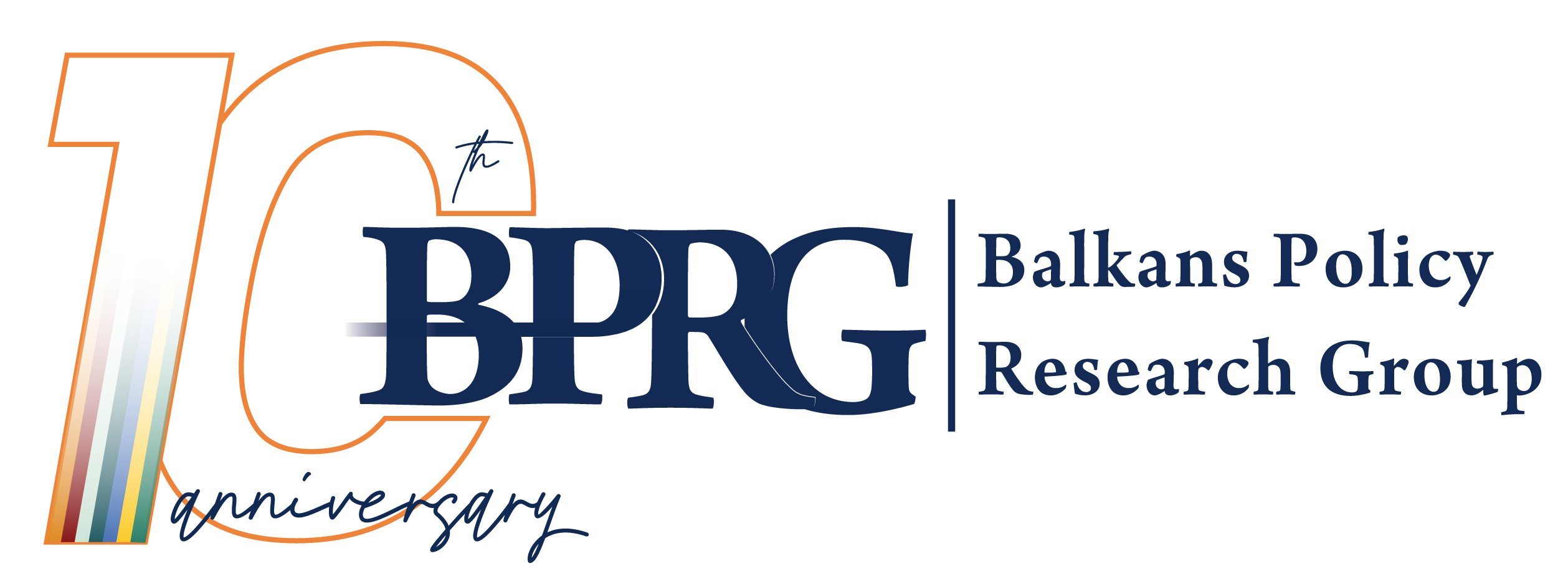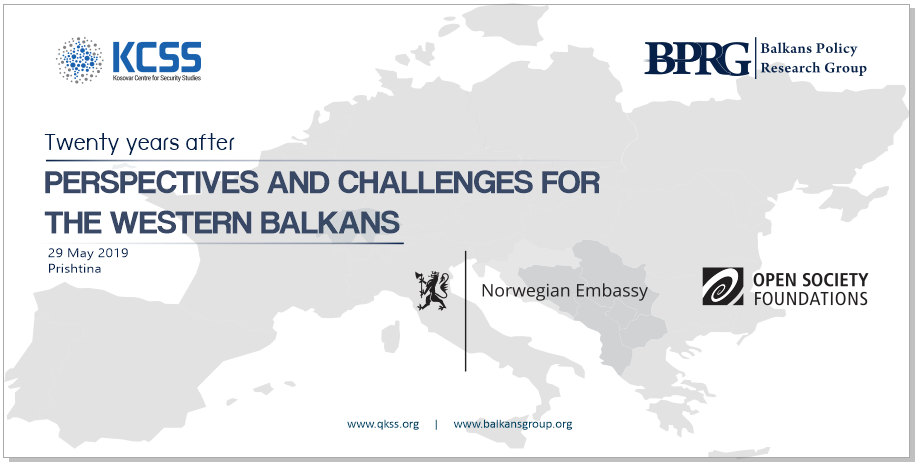29 May 2019 – Kosovar Centre for Security Studies (KCSS) and Balkan Policy Research Group (BPRG) organised the international conference titled “Twenty Years After: Perspectives and Challenges for the Western Balkans” in Prishtina. The conference was organised on the occasion of the 20th anniversary of NATO’s intervention in Kosovo.
The conference organised by KCSS and BPRG analysed some of the most important challenges that the Western Balkans region is facing with regard to the integration process in international organisations, including the EU, NATO and other security organizations.
In addition to local experts and representatives of Kosovo institutions, the conference welcomed distinguished international speakers from the United States, Great Britain, Germany, Norway, Hungary, Slovenia, Russia, Macedonia, and Albania.
The President of the Republic of Kosovo, H.E. Hashim Thaçi, stated that “Kosovo is going through a period where difficult decisions should be made. Kosovo is a success story that has not yet come to an end. Kosovo aspires for membership in the EU and other international organisations. During this journey, we need to overcome other challenges as well. We have made progress in the rule of law and order with the establishment of the Kosovo army and fulfillment of our tasks as a country.”
Susan Falatko, Director of the Western Balkans at the Bureau for Europe and Eurasia from the US Department of State, stated that “our goal, as the United States, is a prosperous and sustainable Western Balkans, rooted in the rule of law and consolidated democratic institutions”.
Meanwhile, Director General for European Relations at the Norwegian Ministry of Foreign Affairs, Niels Engelschiøn, stated that: “Europe is not complete without the Western Balkans. The region belongs to our continent geographically and culturally. Our security, freedom and prosperity depend on each other.”
The conference proceeded with three other panels that were focused on various important topics. The first panel discussed the Responsibility to Protect (R2P); an international security and human rights norm that applies in international cases where international mechanisms fail to address domestic genocide, war crimes, ethnic cleansing and crimes against humanity. During this panel, participants discussed the lessons learned in the past and the road ahead for the Balkan region. The first panel consisted of Mr. Muhamet Hamiti, former Kosovo Ambassador to the United Kingdom and professor at the University of Prishtina; Mr. Aidan Hehir, Lecturer at Westminster University, UK and Mr. Robert Wilton, International Official in Kosovo and Albania.
The second panel focused on peacekeeping missions and regional integration. The core of the panels’ discussion was the current and future cooperation between the Western Balkan countries with EU, NATO, UN and OSCE in the area of peacekeeping missions. Moreover, the panel raised discussion on policy-making at the academic level to strengthen the multilateral cooperation of the Western Balkan region with international actors. The panel consisted of: Mr. Burim Ramadani, Deputy Minister of Defense of the Republic of Kosovo; Mr. Arian Starova, Chairman of the Atlantic Council of Albania and Mr. Giorgios Triantafyllou from the Southeastern Europe Program at ELIAMEP.
Finally, the conference was concluded with a panel discussion on the Kosovo-Serbia dialogue with the aim of examining outside perspectives on the final agreement between the two countries and the ways to move forward towards EU integration. The panel consisted of Mr. Blerim Shala, advisor to the President of the Republic of Kosovo and a member of the negotiation team of the dialogue in the Republic of Kosovo; Mrs. Christiane Hullmann, Deputy Director for the Western Balkans at the Federal Office for Foreign Affairs of Germany; Mr. Maxim Samorukov Deputy Head of the Carnegie Center in Moscow; Mr. Peter Grk, Secretary General of Bled Strategic Forum from the Slovenian Ministry of Foreign Affairs, and Mr. Marko Savković, program director at the Belgrade Fund for Political Excellence (BFPE) who in turn presented their views on the dialogue, the process, and the final solution from the perspectives of the different countries they came from. Consequently, it was noted that most EU countries want to see progress in the dialogue between Kosovo and Serbia, although this process is a complex one. The EU is the one that should provide an environment for dialogue but that the process should be led by Kosovo and Serbia.
The audience questioned the panellist on how Kosovo can build the trust with Serbia, when the war is so recent and there have been no signs of remorse? Mr. Peter Grk stated that “there cannot be a successful dialogue if there is no trust”. According to Mr. Grk, the PRESPA agreement is a story of success and “we must deliver what we promise”.
When asked about Russia’s stance in the dialogue, Mr. Maxim Samorukov affirmed that “Russia wants to keep the status quo, and if that changes there is a chance they might intervene to prevent it. The current Russian statements are ambiguous, it will support any agreement agreed by Belgrade, but also stay only in line with the UN resolution 1244”. The conference, which brought together regional and international actors and stakeholders, dealt with the important issues the region is facing. The panels concluded that the region still has many hurdles to overcome in the journey towards integration into international security organizations. The panellists stated that the goal of international organisations is to create a stable and prosperous Western Balkans. They acknowledged that there is a potential of a full functioning Kosovo, but the focus should be shifted on issues of necessity. It was agreed that the European perspective is a motivation for both Serbia and Kosovo. The conclusion drawn from the conference reaffirmed the fact that there is no Europe without the Western Balkans.
This conference was organized with the support of the Royal Norwegian Embassy in Pristina and the Open Society Foundation.
Below you can find media report links:
- Gazetablic – http://bit.ly/2MxK7SS
- Gazetaexpress.com – http://bit.ly/2ETpASA
- Indeksonline – http://bit.ly/2K4qtMe
- Insajderi.com – http://bit.ly/2XyhlTh
- Klan Kosova – http://bit.ly/2wCXyX5
- Klan Kosova – http://bit.ly/2Z6As7g
- Klankosova – http://bit.ly/2Kyuw35
- Klankosova – http://bit.ly/2Z5C6Gm
- Koha.net – http://bit.ly/2Iq3OHb
- Koha.net – http://bit.ly/2WZr9c9
- KosovaPress – http://bit.ly/2WQbsnu
- RTK – http://bit.ly/2EWHOm9
- RTK – http://bit.ly/2WkF2NE
- RTK – http://bit.ly/2WXQpzu
- RTK 3 – http://bit.ly/2XA5m7K
- RTK 3 – http://bit.ly/2QSaJwF
- RTV 21 – http://bit.ly/2Whk2qY
- RTV 21 – http://bit.ly/2wJpVmg
- RTV 21 – http://bit.ly/2WOQS6J
- Telegrafi.com – http://bit.ly/2XE48sl
- Telegrafi.com – http://bit.ly/2XxKQED
- Tetovasot.com – http://bit.ly/2wGgnIG



